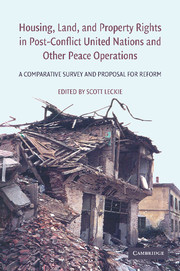 Housing, Land, and Property Rights in Post-Conflict United Nations and Other Peace Operations
Housing, Land, and Property Rights in Post-Conflict United Nations and Other Peace Operations Book contents
- Frontmatter
- Contents
- Contributors
- Acknowledgments
- Foreword by Dan Lewis
- I INTRODUCTION
- II CASE STUDIES
- 2 Stability, Justice, and Rights in the Wake of the Cold War: The Housing, Land, and Property Rights Legacy of the UN Transitional Authority in Cambodia
- 3 The Response of the United Nations Interim Administration Mission in Kosovo to Address Property Rights Challenges
- 4 Balancing Rights and Norms: Property Programming in East Timor, the Solomon Islands, and Bougainville
- 5 Housing, Land, and Property Restitution Rights in Afghanistan
- 6 Peacekeeping and HLP Rights in the Great Lakes Region of Africa: Burundi, Rwanda, and DR Congo
- 7 The Trouble with Iraq: Lessons from the Field on the Development of a Property Restitution System in “Post”-Conflict Circumstances
- 8 Sudan's Comprehensive Peace Agreement: An Opportunity for Coherently Addressing Housing, Land, and Property Issues?
- 9 The Impacts of UN Peace Operations on Local Housing Markets
- III CONCLUSIONS
- Index
7 - The Trouble with Iraq: Lessons from the Field on the Development of a Property Restitution System in “Post”-Conflict Circumstances
Published online by Cambridge University Press: 15 July 2009
- Frontmatter
- Contents
- Contributors
- Acknowledgments
- Foreword by Dan Lewis
- I INTRODUCTION
- II CASE STUDIES
- 2 Stability, Justice, and Rights in the Wake of the Cold War: The Housing, Land, and Property Rights Legacy of the UN Transitional Authority in Cambodia
- 3 The Response of the United Nations Interim Administration Mission in Kosovo to Address Property Rights Challenges
- 4 Balancing Rights and Norms: Property Programming in East Timor, the Solomon Islands, and Bougainville
- 5 Housing, Land, and Property Restitution Rights in Afghanistan
- 6 Peacekeeping and HLP Rights in the Great Lakes Region of Africa: Burundi, Rwanda, and DR Congo
- 7 The Trouble with Iraq: Lessons from the Field on the Development of a Property Restitution System in “Post”-Conflict Circumstances
- 8 Sudan's Comprehensive Peace Agreement: An Opportunity for Coherently Addressing Housing, Land, and Property Issues?
- 9 The Impacts of UN Peace Operations on Local Housing Markets
- III CONCLUSIONS
- Index
Summary
Background
In recent Iraqi history, human rights abuses connected to housing, land, and property (HLP) issues are as complex as they are continuous. The background given here provides only an impression of that complexity. While this commentary primarily looks at responses to HLP issues from March 2003, the time of the occupation of Iraq by a coalition of foreign forces, it necessarily draws upon the deeper history of Iraq's human rights abuses.
In particular, the last four decades in Iraq have been witness to a series of events involving the death and displacement of many Iraqis and the destruction of their properties. In many cases, these abuses have been caused by Iraqi government actions against its' own people. These abuses flew in the face of Iraq's obligations under international law, in particular the Universal Declaration of Human Rights. But there were a number of other specific international instruments that Iraq became party to and then subsequently violated. The instruments that either directly or indirectly enshrine HLP rights include:
International Covenant on Economic, Social and Cultural Rights
Convention on the Elimination of All Forms of Discrimination Against Women
Convention on the Elimination of All Forms of Racial Discrimination
International Covenant on Civil and Political Rights
Convention on the Rights of the Child
Others have suffered too during this period, in particular, Iranians and Kuwaitis.
- Type
- Chapter
- Information
- Housing, Land, and Property Rights in Post-Conflict United Nations and Other Peace OperationsA Comparative Survey and Proposal for Reform, pp. 220 - 259Publisher: Cambridge University PressPrint publication year: 2008


